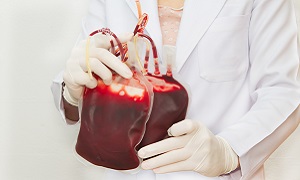Leukemia
Leukemia is a type of cancer that affects the body’s blood forming tissues which includes the bone marrow and the lymphatic system.
Leukemia generally involves the White Blood Cells (WBCs) which are infection fighters in the body. In a normal body, WBCs grow and multiply in an orderly way to meet body’s immunity requirements. However once affected by Leukemia, the bone marrow produces abnormal WBCs and they fail to function properly leading to wide range of complications.
Causes & Risk Factors of Leukemia
- Having a family history of Leukemia.
- Genetic disorders like Down syndrome.
- Bringing the body in contact with high levels of radiation & chemicals such as benzene.
- Blood disorders.
Types of Leukemia
Leukemia is classified according to:
Onset of disease-
- Acute Leukemia- This involves immature blood cells that can’t carry put their normal functions & multiply rapidly.
- Chronic Leukemia- Chronic Leukemia involves mature cells that multiply slow & can function normally for a period of time.
Type of white blood cell affected-
- Lymphocytic Leukemia- This affects the lymphoid cells which form lymphatic tissue.
- Myelogenous Leukemia- Myelogenous Leukemia affects the myeloid cells that give rise to red blood cells, white blood cells and platelet-producing cells.
The four major types of Leukemia are:
Acute Lymphoblastic Leukemia (ALL)
Acute Lymphoblastic leukemia (ALL) is most common type of acute leukemia in adults.
Acute Myeloid Leukemia (AML)
Acute Myeloid Leukemia (AML) is most common type of leukemia in young children & can also occur in adults.
Chronic Lymphocytic Leukemia (CLL)
Chronic lymphocytic leukemia (CLL) is the most common chronic adult leukaemia.
Chronic Myelogenous Leukemia (CML)
Chronic myelogenous leukemia (CML) mainly affects adults.
Signs & Symptoms of Leukemia
- Excessive sweating specially during night.
- Weakness
- Loss of appetite
- Loss of weight
- Bleeding & bruising easily
- Enlarged liver & spleen
- Red spots on the skin
- Pain & tenderness in the bones.
- Pain & swelling in the lymph nodes
- Infections
Diagnosis of Leukemia
- Complete blood count
- Tissue samples are taken from bone marrow or lymph nodes to check for evidence of leukaemia.
- X-ray
- Ultrasound
- CT scan
- Lumbar Puncture- A thin needle is inserted into the vertebrae to collect spinal fluid and check if the cancer has spread to the central nervous system.
- Liver function tests show whether leukaemia cells have spread to the liver.
- Flow cytometry helps to check the DNA of the cancer cells and determine their growth rate.
Treatment of Leukemia
Treatment of Leukemia can involve the following interventions:
Chemotherapy
Chemotherapy is the use of anti-cancer drug that helps to slow or stop the growth of rapidly dividing cells that cause cancer. It prevents the growth of rapidly dividing cells by killing the dividing cells.
Despite its side effects, chemo is still the most widely used cancer treatment option. Unlike radiation and surgery which treats cancer cells at particular locations, chemotherapy drugs can kill cancer cells that have metastated (spread) to different organs in the body.
Radiation Therapy
Radiation Therapy is a kind of cancer treatment that uses high doses of radiation beams to kill cancer cells to shrink the tumors. Radiation kills the cancer cells by destroying the DNA. Cancer cells with damaged DNA fail to multiply and die. They are then removed by the body’s mechanism.
Bone Marrow Transplant
A Bone Marrow Transplant, also called Stem Cell Transplant is a medical procedure recommendedin case of bone marrow damage. The main aim of the medical procedure is to replace a part of the bone marrow that has been destroyed due to some disease, infection, or due to chemotherapy. The replacement of the blood stem cells promotes the growth of new blood cells and tissues around the bone marrow which in turn promotes prompt recovery of the damaged area. This is primarily why this procedure is also known as the Stem Cell Transplant.





